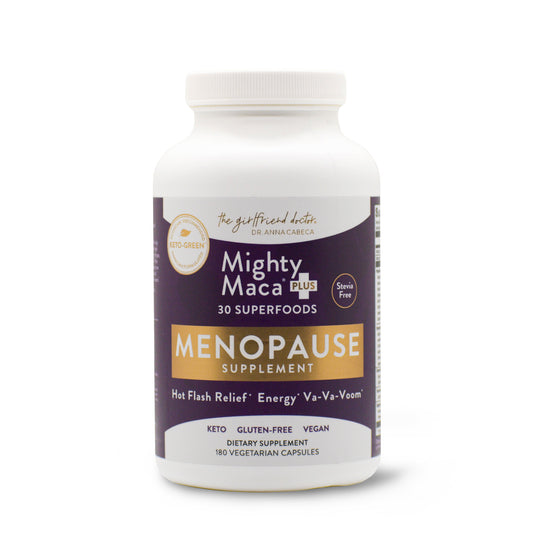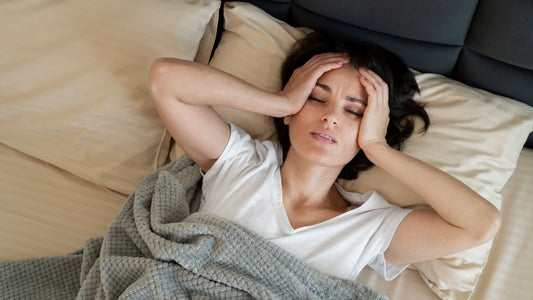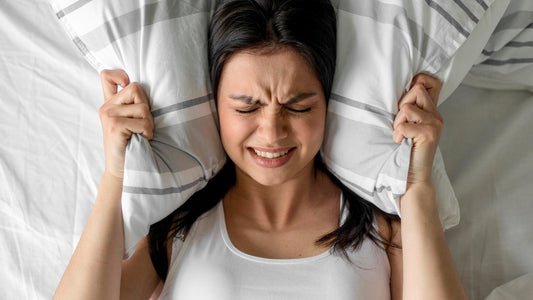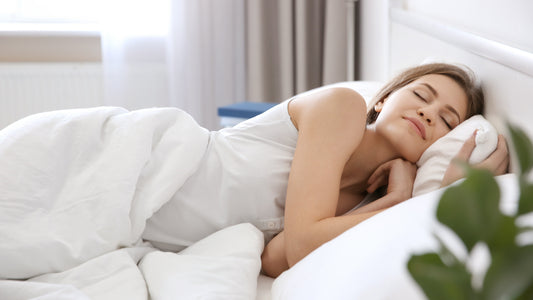
Sleep is one of the most significant issues I routinely hear about from my clients, my Girlfriend Doctor community, and even my peers.
I have suffered from insomnia and poor sleep quality off and on throughout my life, initially as a grad student, and then as a young doctor with an incredibly challenging schedule (getting only a few hours of sleep each night). Pregnancy, momhood, menopause, caregiving, and career have all presented their own sleep challenges and it took a long time for me to develop the practices that still serve me well today in getting a good night’s sleep.
Poor sleep isn’t just a menopause issue although menopause can definitely exacerbate sleep disruption when hot flashes, night sweats, and vaginal dryness symptoms kick in. Sleep disturbances happen throughout a woman’s life. True they interestingly (but not surprisingly) seem to become worse at times of hormonal change and imbalances but there are many other causes of a poor sleep pattern as well.
So let’s talk in-depth about sleep.
A good night’s sleep on a consistent basis will help you age well, keep your immune system strong, decrease your disease risk, support brain health and most importantly it will make you feel vibrant and happy!
Quality sleep also supports improved hunger control and insulin management, helping you maintain a healthier weight.
So optimizing your sleep is important and the fantastic news is that you can improve the quality of your sleep, naturally and effectively.
In today’s blog, I’ll be talking about:
- Why we lose sleep over too little sleep!
- Why women suffer from sleep issues
- How intermittent fasting and the right diet can help you sleep better (and perhaps even sleep skinnier)
- What labs can tell you about your sleep issues
- Natural sleep aids I recommend (and use!)
- “Must do” strategies for a better night’s sleep
Why We Lose Sleep Over Too Little Sleep!
Many people will have an occasional rough night’s sleep (likely due to an overly spicy dinner, a late-in-the-day coffee drink, short-term worries, or a messed up circadian rhythm due to travel or a late night function). We can usually figure out the reason why and we likely don’t stress over it as we know it is short-term.
But many more of us may have consistently poor sleep.
The National Sleep Foundation (as do I!) recommends 7-9 hours of quality sleep on a consistent basis. In studies, getting less than 6 hours or having disrupted sleep is associated with increased risk for a number of poor health outcomes including systemic low-grade inflammation, obesity, insulin resistance, diabetes, somatic pain, neurodegeneration (impacts to memory, cognition, emotional well-being and mood), cardiovascular disease and strokes. (1-5)
Disrupted sleep is also associated with reducing the hormonal control of hunger (by decreasing leptin and increasing ghrelin, resulting in making people feel less full (leptin) and increasing appetite (ghrelin). Research has confirmed that the body can be tricked into thinking it needs more energy (thus the late-night carb-heavy snacking!). So in a way you really can sleep yourself skinny. (6)
“Poor sleep” can be defined as either having lots of sleep disruptions during the night or an inability to fall asleep in the first place. Some people will fall asleep easily only to wake up later and be wired. These types of lingering sleep issues can be more difficult to decipher in terms of cause so people will often start to stress (watching the clock hands tick by, counting up the few hours left prior to having to wake up, etc.), making their sleep problem worse.
Insomnia victims may resort to taking actions that don’t really help (taking ill-timed naps or sleeping late in the day thinking they can simply catch up, taking sleeping pills or even consuming more alcohol at night).
Why Women Suffer From Sleep Issues
Of course, men (and increasingly our children) suffer from sleep issues as well! Men are more apt to have issues such as sleep apnea. Kids are experiencing sleep problems more often these days due to electronics (too much light into the night), poor diet (sugar, carbs, and reactive foods), and stress.
Today, however, I am focusing my comments on my Girlfriend community, including YOU (although many of my recommendations will help the men or children in your life as well).
In my decades as a physician, I have found there to be a number of common causes for a woman’s poor sleep including:
- Caregiving, childcare responsibilities, and a challenging work-life balance
- Hormone imbalances and circadian rhythm disruption
- Nutrient deficiencies
- Underlying health conditions
- Sleep hygiene (sleep environment and PM/AM rituals)
Let’s talk briefly about each of these and how they impact your sleep. Then I’ll talk about what you can do to address these common causes for having poor sleep.
Caregiving, childcare responsibilities and a challenging work-life balance
Until my dear father died a few years ago I was responsible for his caregiving including medical care (prior to that I was a caregiver for my mom as well). As with many women, I also was caring for my kids at the same time (as a single mom!) and was juggling all of that with my role as CEO of my thriving and growing business.
So I personally know how challenging family responsibilities can be (this applies to the male caregivers in the family as well; my brothers were wonderful co-caregivers for my parents). While caring for loved ones is a true blessing it can cause stress and definitely a lack of consistent quality sleep! Self-care is particularly important at this time or at times when you may feel overwhelmed.
Careers can be just as stressful and you may find yourself working late into the night and foregoing the things in your life that make you the happiest and most grounded (like lunch with your girlfriends, hobbies and the like). Listen to this wonderful podcast I did a few years ago with the amazing Pedram Shojai about how to prioritize the important things in life (like your own self-care and family).
Hormone imbalances and circadian rhythm disruption
Diet (both what and when you eat), blood sugar, inflammation, your digestive health, stress, and many other factors can impact hormone balance and maintaining a healthy circadian clock.
Your internal circadian clock drives the sleep-wake cycle which controls many metabolic activities within your body including physical activity (such as sleeping, digestion, and waking) and food consumption (your appetite and feelings of fullness), as well as heart rate, body temperature and the all-important hormone secretion.
This 24-hour clock is controlled by the brain’s suprachiasmatic nucleus (SCN) which detects light brightness via the retina in your eyes. Light travels from the retina to the SCN and signals the pineal gland to control the release of melatonin (our sleep hormone) and cortisol (the body’s stress hormone, but also needed to wake us up and rev up our metabolism).
Poor sleep can be rooted in disruptions to our circadian clock and is often triggered by fluctuations and declines in a woman’s ovarian hormones (including estrogens and progesterone). These same hormonal changes impact other sleep-disrupting effects such as mood, stress reaction, body temperature (did you say hot flashes?), vaginal health, and even our breathing (an important point as I later talk about sleep apnea and other sleep-related breathing problems).
These hormone fluctuations are why women often initially experience sleep pattern changes starting with their periods and PMS, and then again during pregnancy, post-partum, perimenopause, and menopause. Studies have actually found that sleep changes occur across the menstrual cycle as well (sleep quality is typically worse during the mid-to-late luteal phase when ovarian hormones decline). (7)
Fertility studies have found that disruptions to the circadian system in mouse models and in shift-working women caused a number of reproductive issues including low levels of sex hormones to be produced, embryo implantation failure, and reduced newborn size. (8)
As estrogen and progesterone decline in the perimenopause, there is a greater likelihood of ongoing sleep disruptions. Some 40 to 60 percent of perimenopausal women report both sleep disruptions and insomnia. (9) Hormone-related symptoms such as hot flashes, vaginal dryness and pelvic musculature weakening (causing incontinence, pelvic prolapse, and more UTIs) can also occur due to hormone decline, all of which can further impact sleep.
While the estrogen decline during menopause has long been associated with sleep-affecting symptoms such as hot flashes it has also been tied to an increase in fat storage and menopausal weight gain. Now recent research is suggesting that disrupted sleep itself might independently be responsible for menopausal weight gain as well.
In one small study focused on menopausal women (presented at this year’s Endocrine Society annual meeting) researchers found that much like decreased estrogen levels resulted in decreased fat storage utilization, simulated sleep disturbances also led to decreased utilization of fat storage. Researchers concluded that addressing poor sleep during menopause may reduce a woman’s fat storage and subsequent weight gain. (27)
Other hormone fluctuations have also been linked to poor sleep including cortisol, insulin, TSH (Thyroid Stimulating Hormone), and our hunger-related hormones (leptin and ghrelin).
Cortisol is very tied to the body’s sleep-wake state. When cortisol peaks in the early morning, waking us up, melatonin secretion is on the decline. When melatonin is high at night cortisol levels are normally minimal. These hormones are sensitive to retinal light exposure as well as stress (both of which stimulate the release of additional cortisol and can interfere with sleep).
Studies have found that women with thyroid conditions, even subclinical hypothyroidism, will often report having sleep disturbances. (10) I know from my clients having thyroid disorders such as hypothyroidism that they will often experience sleep issues that appear to be triggered by their thyroid symptoms such as digestive issues, joint pain, feeling cold at night, experiencing anxiety, etc.
TSH levels are linked to our circadian clock as well as having poor sleep. TSH levels typically decline during sleep and a good night’s sleep has an inhibitory effect on TSH secretion. When sleep is poor however, TSH levels may remain high even throughout nighttime hours. (11)
Circadian rhythm disruption can also be caused by “resetting” your clock unintentionally
Along with hormonal influences on our circadian rhythms, we can inadvertently impact our internal clock. Some examples of this are due to:
- Traveling/jet lag
- Being a night shift worker
- Underexposure to light during the day
- Too many electronic devices and artificial light exposure at night (blue light in particular)
The importance of intentionally keeping our internal clocks “set” at healthy rhythms is one reason you will find me watching the sunrise and sunset each day (especially when I travel), getting my vitamin D out in the sunlight each day, and reducing my light exposure at night.
There has been a lot of research focused on our circadian clock based on jetlag (think of flight crews flying across multiple time zones) and night shift workers. A substantial amount of research has found that circadian clock disruptions caused:
- Changes in hormone levels
- Stomach and intestinal issues
- Fatigue
- Changes in mood
- Poor ability to sleep (without it being disrupted, fragmented sleep)
- Increased risk for breast cancer (one study with nurses found a 50-100 percent higher incidence of breast cancer associated with sustained night shift work). (12)
Blue light has been found to be especially problematic relating to sleep although any artificial light too late at night can impact melatonin production and shift circadian rhythms. (13, 14)
Blue light is the shortest, highest-energy wavelength in the spectrum and has a wavelength of between approximately 380nm and 500nm.
Sources of blue light include the sun, digital screens (computers, tablets, laptops, TVs, and smartphones), other electronic devices, and LED and fluorescent lighting. I’ll talk about how to block blue light under my recommendations.
Too little light during the day can also be a problem especially as we age. Our eyes may decline and lose some degree of retinal illumination, which decreases light transmission from the retina to the brain (especially the blue part of the light spectrum); as this occurs people may not get enough artificial light indoors (during the day!) which may cause circadian rhythm disruptions. (15)
Nutrient deficiencies
I’ll cover my recommended “sleep” nutrients later but suffice it to say that there are many nutrients (magnesium, vitamin D, B6, and iron are a few examples) that we are often deficient in that can impact sleep as they are needed in the production of our sleep-related neurotransmitters. We’ll talk about these and other sleep-supportive supplements (GABA, melatonin, 5HTP, tryptophan, and adrenal adaptogens) in a moment.
Underlying health conditions
There is a genetic piece to insomnia so don’t be surprised to learn your Aunt Martha and your grandmother have sleep issues too. Gene variations related to sleep-wake processes, arousal regulation and other brain functions have been associated with insomnia. (16) However, know that you can positively affect how these gene variants express themselves through healthy lifestyle choices such as diet.
As mentioned earlier there are natural hormone declines as we age that can result in symptoms that can impact sleep quality (such as vaginal dryness, hot flashes, and incontinence). You can go to the linked articles for lots of recommendations on how to naturally improve upon these conditions. A lot of my clients find that the urge to pee keeps them from getting restful sleep and there are definitely interventions that can help with that. Of course, hot flashes and night sweats can be brutal and disrupt our sleep (and that of our mate, as well).
Any underlying condition that involves pain such as hip, spine, back and joint issues (restless legs syndrome is a big one for many of my clients) can result in fragmented sleep. (17) Incorporating movement and stretching exercises (I’d suggest a physical therapist be consulted), along with a supportive mattress can help.
Having thyroid issues, diabetes, obesity, and other conditions can impact sleep. (18) It’s important to address these issues; often dietary changes, removing reactive foods, and providing supportive nutrients can help.
Given that more men have sleep apnea I also hear from a lot of clients about how their partner’s snoring or CPAP machine affects their own sleep as well. Ear plugs or a white noise/sound machine can be helpful. If you have an Alexa device it is easy to have it play any number of relaxing sounds (such as the sound of ocean waves) that will loop all night. Studies have found that natural sounds (ocean sounds, rain forest, the sound of rain falling, etc.) support a better night’s sleep than white noise. One study found that people who were stressed out prior to bedtime showed the greatest relaxation when listening to natural sounds versus artificial sounds (white noise). (19) I know people who listen to music at night as well. The research actually suggests that listening to relaxing music prior to bedtime (rather than while sleeping) is best.
A surprising number of breathing related sleep issues can occur, including sleep apnea of course. I recently recorded a fascinating podcast focused on less-known breathing related conditions that affect sleep. We talk about the importance of nasal breathing (versus mouth breathing) and how orthodontics plays into that. Who knew there was such a thing as a nasal stent that could help so many people with their breathing at night?
Especially in perimenopause and menopause a woman’s airways may start to relax a little bit more than it should and the airway can narrow at night. This can manifest itself as snoring, airway resistance or full-blown sleep apnea. There is evidence that menopause is associated with an increased risk of developing sleep-disordered breathing. (20)
Medications: Don’t forget to let your doctor know you are having sleep problems as many medications that you may be taking for other health conditions can impact sleep in some way. Certainly, sedatives can negatively affect you, but antidepressants, blood pressure medications, diuretics, muscle relaxants, pain medications, and the like can be detrimental to a good night’s sleep for any number of reasons (including increasing the need to pee during the night, or impacting neurotransmitter activity required for restful sleep).
Sleep hygiene
There is an art to getting a good night’s sleep!
You need the right sleeping environment (temperature, comfort, darkness, etc.), the right nighttime ritual, and a good morning ritual, too. I call all of this “sleep hygiene.” It’s very important and includes relaxation techniques. A lot of people don’t follow the many simple “hygiene” steps that can really help; more on this in a moment when I talk about recommendations.
Now let’s talk about how we can address the many causes of poor sleep.
How Intermittent Fasting and the Right Diet Can Help You Sleep Better (and perhaps even sleep skinnier)
The easiest thing to start with to improve your sleep quality is to adjust how and when you eat. Changing to a Keto-Green® diet (low carb, high healthy fat and so much more) provides numerous health benefits beyond a good night’s sleep as well including:
- Reducing inflammation (helping your body stay more alkaline)
- Providing healthy blood sugar and insulin control
- Balancing hormones
- Strengthening your immune system
- Improving digestive health (the diet removes common reactive foods and supports the gut) and detoxification
- Supporting a healthier weight (helping you become an efficient fat burner!)
- Reducing menopause symptoms such as hot flashes, vaginal dryness and incontinence
- Reduced risk for diseases such as insulin resistance, obesity and diabetes
My Keto-Green diet also incorporates intermittent fasting which further supports insulin control, gut microbiome diversity, reduced body fat (helping to detox and potentially reduce unhealthy estrogen levels), brain health benefits and improved circadian rhythm.
You can read much more about my Keto-Green diet at any of the linked articles or in my best-selling book, The Hormone Fix.
What Labs Can Tell You About Your Sleep Issues
The four lab markers you must know
I typically recommend an annual blood test encompassing 4 key markers for every adult over the age of 40. This panel of key markers can be done at a minimal cost (under $125 in most cases) and can even be ordered without a doctor’s prescription.
The results of this panel will provide important insights into your blood sugar control, immune system resilience, overall inflammatory status, hormonal status and state of your stress response.
The 4 markers are:
- Vitamin D level (25-hydroxy vitamin D test)
- hsC-reactive protein (also called cardio-CRP and highly sensitive CRP)
- Hemoglobin A1C
- DHEA-sulfate
Many women are found to be deficient in vitamin D which is important to sleep as well as overall immune health and strong bones. It has both a direct and indirect role relating to sleep regulation. It is involved in sleep neurotransmitter production (and the production of melatonin) as well as connected to a number of sleep disorders such as restless legs syndrome and sleep apnea. (21) The best solution (and it helps with our circadian rhythm) is to simply get 15-20 minutes of sunshine a day but I also recommend supplementing if you test as deficient (the article provides more details on this).
High CRP results mean your body is inflamed and a high A1C measure can mean insulin resistance. Both of these states can impact your sleep (and poor sleep can impact these markers). Low levels of DHEA-sulfate mean you are not aging well and are associated with immune disorders, insulin resistance, cardiovascular disease, vaginal atrophy, dementia, reduced libido, and more.
All 4 markers are described in detail in this earlier article on important lab markers that everyone should know.
Magnesium
I also recommend magnesium testing (you need to test serum levels via a Magnesium RBC test) for many of the women in my programs as it is a common and important nutrient deficiency. It is estimated that about 80 percent of us are deficient! Low levels are associated with anxiety and sleep issues, as well as osteoporosis, poor blood sugar control, metabolic syndrome, diabetes, hypertension, and a number of other negative impacts on one’s health. (22)
If you have been eating an acidic diet (high in carbs and processed foods) your body’s overall pH load will also become acidic and mineral levels will likely be low (including magnesium). A Keto-Green diet focuses on establishing healthier alkaline pH levels and incorporates nutrient and mineral-rich and pH-balancing veggies. Note that deficient levels of vitamin D can also affect magnesium levels.
IGF-1 (insulin-like growth factor-1)
The IGF-1 marker is an indirect measure of the growth hormone being produced by the body and can be helpful in evaluating pituitary function (remember the pituitary is responsible for melatonin production); your levels may test as low when your body is being stressed, you are having blood sugar issues or you are suffering from poor sleep. (23)
A good functional doctor can work with you in interpreting the above tests or may be interested in additional testing (such as for food sensitivities) that may impact ongoing sleep quality.
Natural Sleep Aids I recommend (And Use!)
I have a regular sleep routine that incorporates a number of natural sleep aids.
Addressing progesterone and estrogen decline
GABA is an important sleep-promoting neurotransmitter and one important role of progesterone is to stimulate our GABA receptors (prescription sleep medications work to stimulate GABA receptors as well but have many side effects). It is the low levels of progesterone and GABA that can result in a “racing mind” when we’re trying to get to sleep. You know that feeling you can’t turn off your brain’s voice as it fusses at you about just about everything!
You can take a GABA supplement but I prefer using my bioidentical progesterone cream, Balance (previously called Pura Balance PPR cream). This true “dream cream” consists of natural progesterone and pregnenolone and works to balance your hormones and mood. You should notice an immediate improvement in your sleep and may find yourself dreaming for the first time in a long time – a sign of truly restorative sleep. You can read much more about all of the wonderful benefits of progesterone beyond sleep, here at the linked article.
While not a “natural” sleep aid, I did think I should at least mention bioidentical estrogen hormone replacement as a possible strategy relating to sleep, in particular for women experiencing severe hot flashes (who do not have a history of breast cancer). Estrogen also promotes serotonin, our calming hormone. (24) Try natural recommendations to address hot flashes first, you can check out several here in the linked article.
As estrogen naturally declines many women also experience other symptoms beyond hot flashes that may also interfere with sleep (such as vaginal dryness and itching, incontinence, and pelvic discomfort). For these symptoms I suggest my feminine restorative vulvar cream, Julva® which contains DHEA and many other nourishing ingredients. You can read more about this beautiful feminine rejuvenating cream here.
Other natural sleep-aids that can help
One of the most important natural sleep aids is magnesium (known as the relaxation mineral! Doesn’t that sound wonderful?) I’ll often find that clients who suffer from anxiety or who have restless sleep have a deficiency in magnesium. I recommend 250 milligrams (you can increase this to 1,000 milligrams) right before bedtime. If you find yourself experiencing loose stools then you’ll want to decrease your dosage. I like taking Magnesium l-threonate found in my Better Brain and Sleep formula, as it has been found to work best for sleep and anxiety issues; it also crosses the blood-brain barrier. I also like to take magnesium-rich Epsom salt baths; so relaxing.
Melatonin supplementation can also help and I recommend my melatonin product, Call It A Nite in the early to mid-evening (around sunset).
In addition to these recommendations, I would like to introduce you to Nite-Zzz Caps. This product relaxes the body and calms the mind, relieves hot flashes and night sweats, boosts daytime mood and energy levels, and supports healthy insulin sensitivity.
Try one thing at a time. I suggest you start with Better Brain and Sleep or Nite-ZZZ. Along with improvements to sleep and anxiety, magnesium is involved in hundreds of other important processes in your body.
As mentioned earlier there are other nutrients that are important in the production of our sleep-related neurotransmitters such as vitamin D, B6, and iron.
For vitamin D3 I find that most women in my programs need to supplement at about 5,000 IUs a day ongoing, perhaps even 10,000 initially or during the winter, then retest, and perhaps lower to a maintenance dose after that. You should test for your D3 levels (check out the earlier referenced article for detailed info on vitamin D3).
You’ll want to test ferritin levels (your stored iron reserves) prior to supplementing as too much is bad for you. Hair loss can be a clue to low iron levels.
5-HTP (5-hydroxytryptophan) is another supplement that I will sometimes recommend to clients who are experiencing insomnia (as well as anxiety, PMS, headaches, and migraines). 5-HTP works in the brain and nervous system to produce the neurotransmitter serotonin which regulates sleep (by converting to melatonin), mood, appetite control, and body temperature. When needed, I typically start clients on 50mg of 5-HTP at bedtime and increase to twice a day and 100mg as needed. Take on an empty stomach prior to bedtime, and take with vitamin B6 for best results (start at 5 mg).
Given that stress and adrenal dysfunction is a big root cause for poor sleep I also always recommend adrenal adaptogens to clients having sleep issues. My favorite is maca. It can help balance hormones, improve your stress response, and address hot flashes and other menopausal symptoms. In one study with perimenopausal women, maca use significantly improved symptoms such as depression, frequency of hot flashes and night sweats, and the lack of quality sleep by 74 to 87 percent. (25) I recommend my maca superfoods drink, Mighty Maca® Plus, and you can try Mighty Maca Plus here.
Some final thoughts on natural sleep aids
A few other things you can try:
- Herbs such as kava, lemon balm, valerian root and chamomile (try them in nighttime teas)...they are almost as good (and much better for your sleep) than that glass of red wine late at night.
- Essential oils such as lavender are helpful for sleep and check out this earlier article on essential oils that have been shown to be effective for hot flashes.
Must Do Strategies For a Better Night’s Sleep
In this final section, I’ll talk a bit about sleep-promoting strategies you should definitely focus on as a priority. They are easy to implement and can have great results.
I’ll talk briefly about,
- Sleep hygiene (preparing the best environment for sleep, having a morning and evening sleep-supportive ritual)
- Blue light blocking
- Identifying your sleep patterns
Sleep hygiene: creating the perfect sleep space
Your bedroom should be a space used for sleeping or lovemaking. If you can, don’t use it as an office or television entertainment center. At bedtime, your bedroom should be super-dark, at a comfortable temperature (65°F), quiet (unless you are using a sound machine of some kind) and free of clutter and distractions (while pets are lovely they can often be the source of sleep disruptions, so do give that some thought if this is an issue in your home). Perhaps your beloved pet is better off in their own bed.
A comfortable bed that is adjusted just for you is beneficial. Invest in the right soft/firm pillow for your sleep type (side, back, etc.). You spend a lot of time in bed so quality is essential especially if you have joint pain of any kind. Don’t ignore your doctor’s advice relating to treatment for sleep apnea, restless legs syndrome, etc. I find that having a portable air filter is helpful for women having allergies (plus a good HEPA filter can remove many environmental toxins from the air which could be bothering you at night).
Sleep hygiene: have an evening sleep-supportive ritual
Have a regular evening routine that tells your body it is time to wind down, calm down, and go to sleep! I like having a cup of chamomile tea, listening to calming music, sometimes taking a relaxing magnesium soak in an Epsom bath, spritzing lavender essential oil on my pillow, and doing deep breathing and meditation. I used to love reading to my young daughters as a way to wind down; now I often can be found listening to a good audiobook (but nothing requiring too much brain activation!).
You should also follow these evening tips:
- Watch the sunset if you can. Reduce lighting throughout the evening and in particular reduce blue light (more info below)
- Stop eating two to three hours prior to bedtime so your body doesn’t have to focus on digestion rather than relaxation and sleep. If you are following my Keto-Green diet you will be doing intermittent fasting which is ideal for promoting digestive rest (and you’ll also be avoiding fatty foods and refined carbs which can spike your blood sugar!)
- If you must have a snack before bedtime try and make it at least a few hours prior to turning in and try a carbohydrate with a little bit of protein to increase the amino acid tryptophan (known to induce sleep in most people although there are gene variations that may make the sleepiness effect minimal in some people). I like a sliced apple with an ounce of peanut butter when necessary. (26)
- Avoid caffeinated beverages and foods from early afternoon on. You know your own tolerance for this (I can have a late coffee and metabolize it quickly so it doesn’t affect me, but many people can’t).
- Avoid alcohol before bedtime even if you think it helps you fall asleep. While it may, it also will disrupt your overall sleeping patterns so you will either wake-up in the middle of the night, wide-awake, or you may feel unrested in the morning. Best to avoid alcohol or have your last drink at least 5 hours prior to turning in.
Sleep hygiene: have a morning sleep-supportive ritual
Sleep hygiene is also about what you do in the morning! The first thing you need to do when you awaken is let some natural sunlight hit your eyes; we love watching the sunrise at our house when possible.
Other important morning and daytime rituals in my life consist of:
- Gratitude journaling can help you restore positive energy in your life; try it and you will get hooked. List a few things each morning for which you are grateful. This simple exercise will destress you and help your mood and I believe it kick-starts my healthy rhythms for the day! You can read this earlier blog for other ideas on how to mentally detox the negativity if your life. A few minutes of deep belly breathing or meditation can really help.
- Grounding into earth’s energies and connecting with nature can help reset your circadian rhythms, plus walking barefoot, sitting on the grass, going for a hike in nature, and forest bathing all just make us feel so good! Being outside provides the light we need to establish a healthy circadian clock and provides us with optimal levels of vitamin D (important for sleep neurotransmitter creation and our immune system health among other things).
- Plan a few oxytocin moments in your day. Oxytocin is our bonding and love hormone, it counters the stress hormone, cortisol, and can help you be calm and centered (supportive of your circadian clock). Take my oxytocin quiz to see if you have enough of my favorite hormone in your life!
Blue light blocking
Reduce electronics by 9:00 pm if you can but there are many types of blue light blockers now on the market for your computer screens, mobile phones and other electronic devices. I use an app on my computer called F.lux found at https://justgetflux.com/. It reduces blue light generated by my screen.
I have also purchased blue light-blocking eyeglasses for my daughters from Viva Rays (click the link for a 10% discount on your order) as well as blue light-blocking screens for iPhones (try products from TRUE DARK - use code DRANNA10 for 10% off your next purchase and keep your digital clocks and phones in the bathroom (to block out LED lights and reduce EMF exposure).
It’s also important to make sure you are exposed to bright light during the day! So if you are an at-home worker and indoors all day please be sure to take a few breaks, go for a walk, and get some vitamin D and bright natural light! Earlier in the day is best for supporting your circadian clock.
While a typical office may have a light intensity of between 150 and 1,000 lux (your home-based office is likely much less intensity as well), being outside in the sunshine can mean getting light exposure that is 10 to 1000 times brighter. Use the earlier referenced suggestions to get outside that include grounding (I do this when I travel to help reset my circadian clock), forest bathing and more.
Identify your sleep patterns
I have used a product from sleepcycle.com for years. It helps identify your sleep patterns and sleep cycles (I use it in airplane mode to lessen EMFs). It is fascinating to see your sleep patterns and identify daytime activities that may be causing disruptions. You can track how that late cup of coffee resulted in a poor night’s sleep, etc. I like how you can set your alarm to wake you up at the optimal time in your sleep cycle to feel most refreshed as well.
Final Thoughts On Sleep
Start with the simple things first such as improving your diet and sleep hygiene. You may find that those things alone really help. As you go about your day keep your circadian clock in mind! Get that burst of light on your eyes first thing in the morning and keep things dark at night. Enjoy some sunshine and the health benefits of being outdoors each day.
Address underlying conditions which can be adding to your sleep challenges such as vaginal dryness, hot flashes, joint pain, sleep apnea and breathing issues. Ensure your mate is addressing their sleep issues as well (so they can sleep more restfully and so not to disturb your sleep).
Don’t shortchange the need for self-care! We women do a lot and need to learn to reserve time in each day to be reflective of that (as well as grateful for our many roles in nourishing others’ lives). Your nighttime routine can include some very pampering rituals such as Epsom baths and essential oils. Include your partner and add a massage or other oxytocin moments (and note that love-making is a great oxytocin-generating activity as well).
Breathe and relax, often and peacefully.
Finally, consider a few natural sleep aids if you are still struggling with quality sleep. Stay away from prescription sleeping medications and vices (alcohol, smoking, drugs, etc.) which typically come with side effects.
Sweet dreams and nightie-night!
Bibliography
1) https://www.ncbi.nlm.nih.gov/pmc/articles/PMC4542146/
2) https://pubmed.ncbi.nlm.nih.gov/30920354/
3) https://www.ncbi.nlm.nih.gov/pmc/articles/PMC5449130/
4) https://pubmed.ncbi.nlm.nih.gov/24731536/
5) https://www.ncbi.nlm.nih.gov/pmc/articles/PMC4604227/
6) https://www.ncbi.nlm.nih.gov/pmc/articles/PMC4604227/
7) https://www.ncbi.nlm.nih.gov/pmc/articles/PMC7597864/
8) https://pdfs.semanticscholar.org/6a12/66acfc5af7c86617ed3f7ed6686d68f86be7.pdf
9) https://www.ncbi.nlm.nih.gov/pmc/articles/PMC4542146/
10) https://www.ncbi.nlm.nih.gov/pmc/articles/PMC6927586/
11) https://www.hindawi.com/journals/ije/2010/259345/
12) https://pubmed.ncbi.nlm.nih.gov/30311830/
14) https://www.ncbi.nlm.nih.gov/pmc/articles/PMC7065627/
15) https://www.ncbi.nlm.nih.gov/pmc/articles/PMC7065627/
16) https://www.ncbi.nlm.nih.gov/pmc/articles/PMC4388122/
17) https://www.ncbi.nlm.nih.gov/pmc/articles/PMC5449130/
18) https://www.ncbi.nlm.nih.gov/pmc/articles/PMC4604227/
19) https://www.sciencedaily.com/releases/2017/03/170330132354.htm
20) https://www.ncbi.nlm.nih.gov/pmc/articles/PMC7597864/
21) https://pubmed.ncbi.nlm.nih.gov/32156230/
22) https://www.ncbi.nlm.nih.gov/pmc/articles/PMC6212970/
23) https://pubmed.ncbi.nlm.nih.gov/31778943/
24) https://www.ncbi.nlm.nih.gov/pmc/articles/PMC7597864/
25) https://www.ncbi.nlm.nih.gov/pmc/articles/PMC3614644/
26) https://www.ncbi.nlm.nih.gov/pmc/articles/PMC6628462/
27) Grant LK, Coborn JE, Cohn A, et al. Effect of experimentally induced sleep fragmentation and hypoestrogenism on fasting nutrient utilization in pre-menopausal women. Presented at: ENDO 2021; March 20-23, 2021. Presentation OR17.







